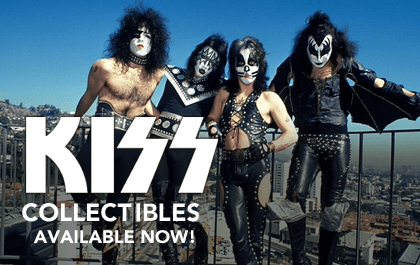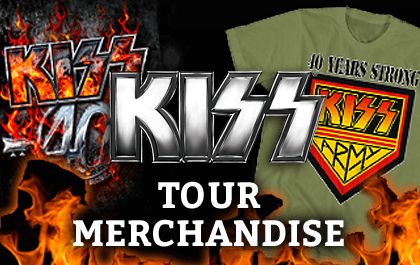11/19/2009
ROCK ICONS READY TO ROCK CENTRAL VALLEY

Band, complete with makeup, will play Saturday at Save Mart Center
By EDNA GUNDERSEN
"Look at Kiss culture," says Gene Simmons, radiating pride. "People tattoo their bodies with Kiss faces, name their children after our songs, have Kiss conventions."
"This is Planet Kiss; we just live on it. The stage is holy ground, and what we do is electric church."
Holy hyperbole! The kabuki kibitzers of big-top rock are back in greasepaint and spandex, armed with a new album and a fresh stage spectacle to solidify a legacy built on thundering riffs, pyrotechnics, superheroic role-playing and hucksterism. That new stage spectacle comes Saturday to the Save Mart Center on the campus of California State University, Fresno.
Rock icons Kiss ready to rock Central Valley
Band, complete with makeup, will play Saturday at Save Mart Center
By EDNA GUNDERSEN
"Look at Kiss culture," says Gene Simmons, radiating pride. "People tattoo their bodies with Kiss faces, name their children after our songs, have Kiss conventions."
"This is Planet Kiss; we just live on it. The stage is holy ground, and what we do is electric church."
Holy hyperbole! The kabuki kibitzers of big-top rock are back in greasepaint and spandex, armed with a new album and a fresh stage spectacle to solidify a legacy built on thundering riffs, pyrotechnics, superheroic role-playing and hucksterism. That new stage spectacle comes Saturday to the Save Mart Center on the campus of California State University, Fresno.
The singer/bassist, 60, and guitarist Paul Stanley, 57, are meeting in the Sunset Strip office of manager Doc McGhee to chat up "Sonic Boom," Kiss' 19th studio album and first since 1998's "Psycho Circus."
The album is a three-disc set with a CD of re-recorded hits and a DVD of a Buenos Aires concert packaged with 11 new songs.
It's $12, "the price of a sandwich," Simmons crows. The band comes Saturday to the Save Mart Center in support of the new album.
Crafting "Boom" was one of the easiest and most joyous projects in the band's 36-year run, Stanley says. But he would not have stepped in the studio without the title and authority of producer.
"In the creative process, democracy is vastly overrated," he says. "The whole idea of everybody having a say is terrific, but in the end someone has to make a decision."
"We've had some failed attempts in the last decade or two at trying to make a great Kiss album. I have to chalk that up to having band members who perhaps had the wrong priorities or no priorities."
"I didn't want any outside writers. What you wind up with is somebody's interpretation of what Kiss is. Who knows better what Kiss is than Kiss? I wanted to capture the spirit, the hunger of the band at its best."
Guitarist Tommy Thayer and drummer Eric Singer flesh out the Kiss lineup, replacing originals Ace Frehley and Peter Criss, who have had a rocky history with the band and made their most recent exits in 2003 and 2004, respectively.
To those who suggest their absence diminishes Kiss, Stanley snaps: "Put Willie Mays in a baseball uniform and see how well he hits. The magic you remember isn't there."
"Quite honestly, the whole idea that there were four people putting in the same amount of effort is nonsense. Never happened. This is the band in its ideal form. No other lineup could have made 'Sonic Boom.'"
Kiss, long a popular target of the music press, has never kissed up to critics and vice versa, though the same revisionism that upgraded Led Zeppelin over time seems to be casting a kinder light on the Kiss saga.
"Art to me is the name of a nice guy," Simmons says dismissively. "Critics never understood. Put them on a roller coaster: Everyone else has the time of their lives, and critics say, 'What does it mean?' They missed the ride."
"Anytime we meet a new band, they say, 'We cut our teeth on your records.' When you see fireworks at Paul McCartney's show, where do you think that came from? 'N Sync? Why should I care about critics when we have 3,000 licensed products, 35 years of touring and every band in the book pointing to Kiss as the pivotal reason they wanted to do something big on stage?"
Besides, touring and merchandise are crucial lifelines to offset losses incurred by piracy.
"You grab an album and leave a store, they put you in handcuffs," Stanley says. "And yet someone on the Internet can decide whether or not I get paid. File-sharing, that's like me stealing your car and telling you I'm sharing your transportation."
Illicit downloading is one reason the band resisted recording new material for a decade, says Simmons, sneering: "These freckle-faced college kids have destroyed an entire industry by stealing. I don't believe in socialism and, the last time I checked, what we do isn't charity."
It's drug-free, fun-driven capitalism with zero tolerance for rock-star cliches that glamorize self-destructive behavior.
"When we first became very successful, everyone fell prey to their own vices," Stanley says. "Drugs, alcohol, women, sycophantic friends. There are piranhas just waiting to put one arm around your shoulder and the other in your pocket. That rock 'n' roll lifestyle is a cartoon, and it's pathetic. You're either a laughingstock or you die. Being a musician who lasts 40 years is nothing short of hard work."
For all their swagger and ego, Simmons and Stanley say they're humbled by the band's longevity and express enormous respect for the Kiss Army.
"We're privileged," Simmons says. "There but for the grace of God, anyone of us would be asking the next person in line, 'Would you like fries with that?' What have I got to complain about? I'm filthy rich. I've been there, done that and owned the T-shirt with my own face on it."
By EDNA GUNDERSEN
"Look at Kiss culture," says Gene Simmons, radiating pride. "People tattoo their bodies with Kiss faces, name their children after our songs, have Kiss conventions."
"This is Planet Kiss; we just live on it. The stage is holy ground, and what we do is electric church."
Holy hyperbole! The kabuki kibitzers of big-top rock are back in greasepaint and spandex, armed with a new album and a fresh stage spectacle to solidify a legacy built on thundering riffs, pyrotechnics, superheroic role-playing and hucksterism. That new stage spectacle comes Saturday to the Save Mart Center on the campus of California State University, Fresno.
Rock icons Kiss ready to rock Central Valley
Band, complete with makeup, will play Saturday at Save Mart Center
By EDNA GUNDERSEN
"Look at Kiss culture," says Gene Simmons, radiating pride. "People tattoo their bodies with Kiss faces, name their children after our songs, have Kiss conventions."
"This is Planet Kiss; we just live on it. The stage is holy ground, and what we do is electric church."
Holy hyperbole! The kabuki kibitzers of big-top rock are back in greasepaint and spandex, armed with a new album and a fresh stage spectacle to solidify a legacy built on thundering riffs, pyrotechnics, superheroic role-playing and hucksterism. That new stage spectacle comes Saturday to the Save Mart Center on the campus of California State University, Fresno.
The singer/bassist, 60, and guitarist Paul Stanley, 57, are meeting in the Sunset Strip office of manager Doc McGhee to chat up "Sonic Boom," Kiss' 19th studio album and first since 1998's "Psycho Circus."
The album is a three-disc set with a CD of re-recorded hits and a DVD of a Buenos Aires concert packaged with 11 new songs.
It's $12, "the price of a sandwich," Simmons crows. The band comes Saturday to the Save Mart Center in support of the new album.
Crafting "Boom" was one of the easiest and most joyous projects in the band's 36-year run, Stanley says. But he would not have stepped in the studio without the title and authority of producer.
"In the creative process, democracy is vastly overrated," he says. "The whole idea of everybody having a say is terrific, but in the end someone has to make a decision."
"We've had some failed attempts in the last decade or two at trying to make a great Kiss album. I have to chalk that up to having band members who perhaps had the wrong priorities or no priorities."
"I didn't want any outside writers. What you wind up with is somebody's interpretation of what Kiss is. Who knows better what Kiss is than Kiss? I wanted to capture the spirit, the hunger of the band at its best."
Guitarist Tommy Thayer and drummer Eric Singer flesh out the Kiss lineup, replacing originals Ace Frehley and Peter Criss, who have had a rocky history with the band and made their most recent exits in 2003 and 2004, respectively.
To those who suggest their absence diminishes Kiss, Stanley snaps: "Put Willie Mays in a baseball uniform and see how well he hits. The magic you remember isn't there."
"Quite honestly, the whole idea that there were four people putting in the same amount of effort is nonsense. Never happened. This is the band in its ideal form. No other lineup could have made 'Sonic Boom.'"
Kiss, long a popular target of the music press, has never kissed up to critics and vice versa, though the same revisionism that upgraded Led Zeppelin over time seems to be casting a kinder light on the Kiss saga.
"Art to me is the name of a nice guy," Simmons says dismissively. "Critics never understood. Put them on a roller coaster: Everyone else has the time of their lives, and critics say, 'What does it mean?' They missed the ride."
"Anytime we meet a new band, they say, 'We cut our teeth on your records.' When you see fireworks at Paul McCartney's show, where do you think that came from? 'N Sync? Why should I care about critics when we have 3,000 licensed products, 35 years of touring and every band in the book pointing to Kiss as the pivotal reason they wanted to do something big on stage?"
Besides, touring and merchandise are crucial lifelines to offset losses incurred by piracy.
"You grab an album and leave a store, they put you in handcuffs," Stanley says. "And yet someone on the Internet can decide whether or not I get paid. File-sharing, that's like me stealing your car and telling you I'm sharing your transportation."
Illicit downloading is one reason the band resisted recording new material for a decade, says Simmons, sneering: "These freckle-faced college kids have destroyed an entire industry by stealing. I don't believe in socialism and, the last time I checked, what we do isn't charity."
It's drug-free, fun-driven capitalism with zero tolerance for rock-star cliches that glamorize self-destructive behavior.
"When we first became very successful, everyone fell prey to their own vices," Stanley says. "Drugs, alcohol, women, sycophantic friends. There are piranhas just waiting to put one arm around your shoulder and the other in your pocket. That rock 'n' roll lifestyle is a cartoon, and it's pathetic. You're either a laughingstock or you die. Being a musician who lasts 40 years is nothing short of hard work."
For all their swagger and ego, Simmons and Stanley say they're humbled by the band's longevity and express enormous respect for the Kiss Army.
"We're privileged," Simmons says. "There but for the grace of God, anyone of us would be asking the next person in line, 'Would you like fries with that?' What have I got to complain about? I'm filthy rich. I've been there, done that and owned the T-shirt with my own face on it."





